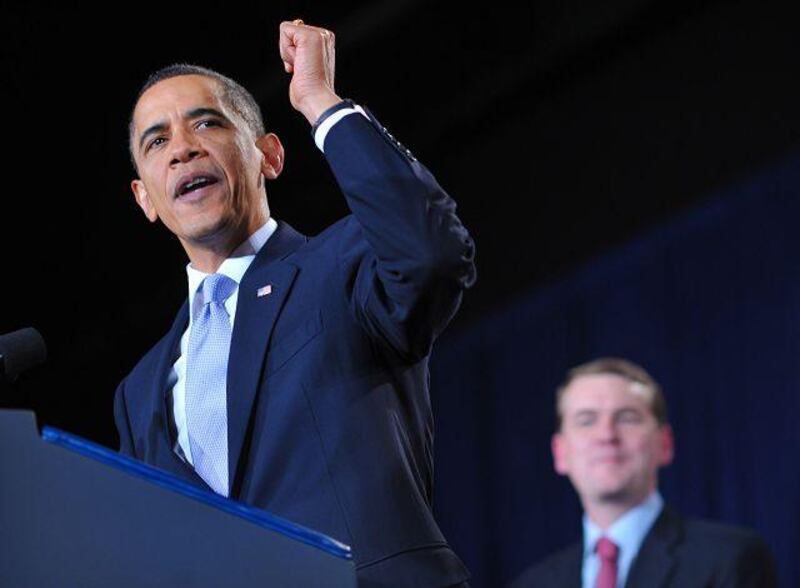DENVER // A year ago, Barack Obama was in Colorado to sign what turned out to be the only major piece of legislation signed into law during his first year in office: the $787 billion (Dh2.89 trillion) federal stimulus package. This month, he was back in Denver again, officially here to campaign for a Democratic senator with a tough race ahead, but also trying to convince sceptical Americans that the largest government cash injection in US history has put the economy on the road to recovery.
"Our work is far from over but we have rescued this economy from the worst of this crisis," the US president said. Many economists agree that the stimulus created a modest cushion for an economic decline that could have been far worse, saying that the stock market and housing sector have stopped sliding downwards, and that consumer spending has edged slightly up. But the bigger problem for Mr Obama is that millions of unemployed Americans are not feeling any relief.
Take Ruth Hinkson, a resident of Dallas, Texas, who was laid off from her job as a clerical assistant in March of 2008. Since then, in order to comply with federal regulations to receive unemployment benefits, she has applied for five jobs every week. In almost two years, she has had only six responses, none of which led to a job offer. "Where are all these jobs that they we're supposed to be stimulating?" she asked. "I have reached the point where I'll apply for anything. But the jobs just aren't out there."
Despite what appears to be a modest turnaround in the overall economy, the latest statistics on unemployment in the United States are sobering. More than seven million jobs vanished during the recession, with about one in 10 Americans still out of work. The number of people who have been unemployed for more than half a year has hit a record 5.9 million, and according to one recent study there are six people applying for every available job.
Worse yet, when you combine the number of unemployed with those who are under-employed - or only able to find part-time employment - the number of affected Americans rises to 17.4 per cent of the population, the highest rate since the 1930s. "The new unemployment numbers are devastating, and they should send up red flares in Washington," wrote John Nichols, a Washington columnist, for the Nation magazine.
According to a recent CBS News/New York Times poll, a mere six per cent of Americans believe that Mr Obama's stimulus package actually created jobs. Fifty-four per cent think it helped only bankers and investors, according to a separate survey by CNN. End-of-year reports that Wall Street banks and investment firms had not only recovered - thanks in part to the separate $700bn taxpayer-funded bailout known as Tarp - but also paid a jaw-dropping $40bn in bonuses have enraged the nation.
The insurance giant AIG, which alone received $150bn in bailout money, responded by paying executives in its troubled financial products division, widely blamed for triggering much of Wall Street's woes, more than $100 million in bonuses. "They get millions, and we get unemployment," said Ms Hinkson. "I want to know when this stimulus is going to reach the middle class." In January, a combative Mr Obama exhorted the US Congress to deliver him a jobs bill. His staff has taken pains to assure Americans that half of the stimulus money will be spent this year, and that it should create thousands more jobs. The government website recovery.gov claims that stimulus money has already created more than half a million positions.
However, leading economists have suggested that it could take the better part of this new decade for the job market to recover entirely. The Federal Reserve's analysts suggest the jobless rate could remain as high as 7.6 per cent through 2012. Even those who feel the economy has already touched bottom are worried about the jobs future. Cody Jones, a 25-year-old unemployed veteran who served in Iraq, is searching for work in the public safety sector, applying for jobs with the police and the US Border Patrol.
With a wife and twin two-year-old boys to support, Mr Jones says he cannot afford to wait much longer to find work. The money he saved while deployed to Iraq has dwindled to almost nothing. "I feel like the economy is starting to turn around," he said. "But I worry those unemployment numbers are going to stay high for a couple more years." foreign.desk@thenational.ae






